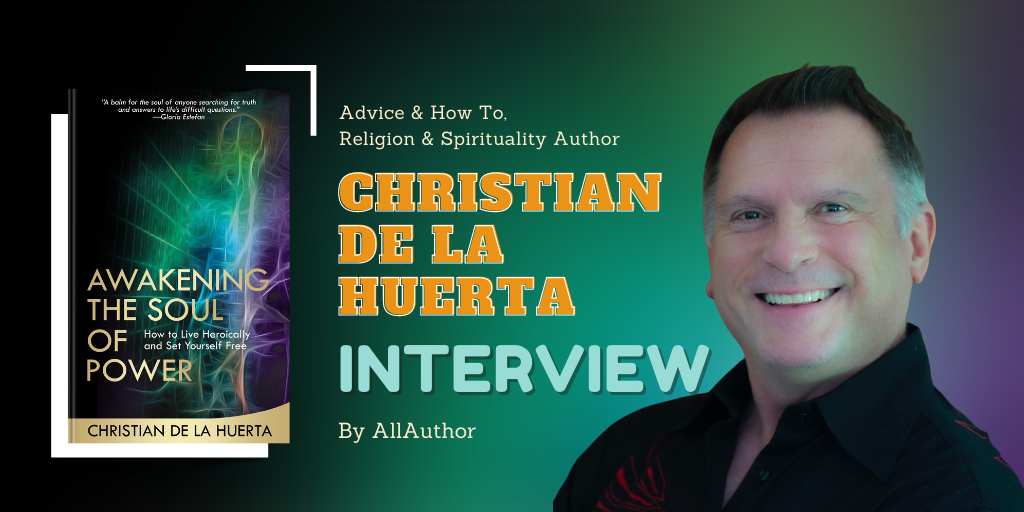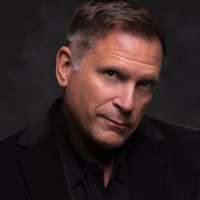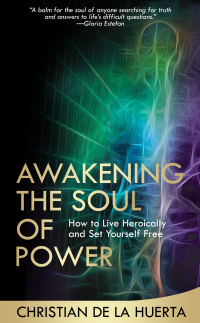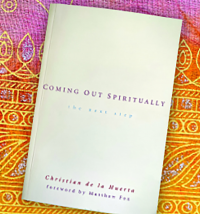Christian De La Huerta Interview Published on: 04, Feb 2021
 What childhood memory has had the best impact on you?
What childhood memory has had the best impact on you?
I grew up in Cuba the first ten years of life. The memory that popped into mind was being on a plane to Madrid when we were at last able to emigrate. I remember the feeling of freedom and the possibility of a new world. I’ll never forget the first supermarket I went to and seeing things I’d only read about. For context, when we were kids my parents used to get the little packs of chiclets from friends who worked in foreign embassies. Because we were so many kids we split the gum among us. I remember chewing it all day and then sticking it in a glass with a little water and adding toothpaste, so that it’d be minty the next day. And then hiding it, so my mom wouldn’t thrown in out! And we had it better than most because my dad was a doctor! What’s gum to us in the developed world? Nothing. We stick it in our mouths and throw it out without a moment’s thought. Growing up in that environment gave me an appreciation for freedom, certainly, and beyond that, for many other things too easily taken for granted.
Do you remember the first book you ever read?Part of life growing in a communist country meant that we had a TV but there was nothing worth watching, except old American movies (which I didn’t appreciate at the time) and government propaganda. So we grew up reading and inventing our own games—for which I am deeply grateful! I developed a life-long love affair with books. I remember reading the lives of the saints (my parents were very Catholic—nine kids!) and the Tarzan series. Those were my first heroes!
When did you get comfortable speaking in front of groups of people?That’s a loaded question! I am an unlikely candidate to be writing and teaching about power, heroism, and leadership. I am predominantly an introvert and was painfully shy as a teenager. My adolescence was one long depression as I struggled with existential questions of identity, purpose, reconciling my sexuality and spirituality. I know self-doubt and lack of self-worth. I was terrified of public speaking. In retrospect, I subconsciously sabotaged my 4.0 GPA so that I wouldn’t have to give the valedictorian address. I just wasn’t ready for that. After college I signed up for a public speaking course, which I hated! Every Thursday night for 14 weeks I’d have to give three two-minute speeches. Come Monday, I was already “angsting” and losing sleep about it. But midpoint through the process, it stopped being such a big deal. Which is the way to approach anything we’re afraid of, right? By just doing it. Being fearless doesn’t mean we no longer feel fear; we just don’t allow it to hold us back anymore.
By the way, these days, no matter the circumstances of my life—a relationship works out or it doesn’t; a project succeeds or fails—I never question my self-worth. I am now an internationally recognized teacher who has spoken to thousands all over the world, including the TEDx stage. That I overcame such insecurity and self-doubt is hopeful for anyone who has also faced such challenges. That’s why I know that these teachings I write about work. If I was able to find self-love and step into my own power, anyone can!
In what ways do you think earning a degree in psychology has helped you in your career?It has definitely added to my ability to understand the human experience, which I think was one of my drivers for majoring in that, the need to understand why I did the things I did, or get caught in patterns of self-sabotage or unfulfilling relationships. My psych degree also fell short of the mark. It’s absurd that my father got through med school and a specialty in psychiatry while remaining clueless about his own emotions, or that I got a degree in psychology and was ignorant of mine. You would not believe how clueless I was about my own emotions. I couldn’t tell you what I was feeling because I had no idea. I was brilliant at suppressing them. Though he never said it in so many words, I learned from my father’s example that logic, rationality and self-control were superior to the emotions. To become emotional was a sign of weakness; it meant a loss of control. I think there was also an implicit element of sexism in that attitude. My mother was much more emotional and I think my father was both drawn to her passion and aliveness while, at the same time, judging it as less evolved. Here’s how I learned to educate myself about my emotions. Every day for a few weeks, I used to print out a grid of emotions organized by their type of energies: anger, sadness and wellbeing. I’d carry around a timer (this was before smartphones!) and on the hour I’d pause and look at my grid and ask myself: What am I feeling? Am I feeling that? And then put a check by it so I could begin to notice patterns as time went by. Becoming more emotionally self-aware made all the difference in my relationships. I became much more adept at life, including professionally. I also became more human, less aloof, more connected. Later, spiritual teachings complemented what psychology was not able to provide for me.
How much time did you spend reading and learning while writing your book, Awakening the Soul of Power?In a way, a lifetime. I’ve been consciously brewing the book for the last 8-10 years, testing out ideas in retreats, practicing them myself. Honestly, it took COVID to sit my butt down and get it finally done in about six months. Before that I was constantly on the road, from one event or retreat to the other. I wasn’t allowing myself enough time to slow down and drop into the creative flow. Most of the reading and research I’d done before; the pandemic forced me to be still, home, in one place.
How has been your experience of being the creator and teacher of several self-development programs?That’s the most humbling part of all I do. To be an instrument in another person’s process of healing and empowerment . . . I don’t know what beats that! I am particularly excited about a new year-long program, Adventures in Transformation. The magic of this program is that, unlike a weekend retreat, it allows me to stretch out the teachings over a year and deliver them in a piecemeal manner with elements of interactivity, gamification, support and accountability. This approach makes learning more manageable and makes it possible for people to apply and integrate the teachings into their lives more efficiently. The intent is for the program to be a heroic step toward awakening, embodying and living into the potential you know already know lives inside of you! Who would you be if you could break limiting beliefs and patterns that hold you back? What would your life look like if in every situation you showed up authentically with confidence? What would be possible if you no longer put off that pesky and persistent calling of your soul's purpose? That’s what Adventures in Transformation is all about. By the end of the program, your life is going to look and feel completely different—in profound and positive ways. Guaranteed!
Did you expect your award winning book, Coming Out Spiritually to be chosen by Publisher’s Weekly as one of the 10 best religion books of its year? What was your reaction?No way! I didn’t even know then about any of the award categories or the importance of being recognized by PW. I didn’t know it was the “bible” of the publishing industry! I was excited, disbelieving, honored and humbled. For this new book, Awakening the Soul of Power, what elicited the same feelings and has me blown away is the endorsement from music icon Gloria Estefan.
What challenges did you face while publishing your book, Coming Out Spiritually: The Next Step?When I wrote that first book, I missed the first deadline from the publisher. You see, every time I thought that I had to write a book, I froze. All sorts of scary and disempowering thoughts would rise: “Who am I to write a book? What do I have to say for 300 pages? I don’t want my thinking and writing to be judged and criticized; in fact, I don’t even want to be in the public eye!” Yet, I’ve always been driven by a sense of mission, and knew I had to do it. After the missed deadline, I thought, OK, I’ve spent half the advance and now really have to do this. And then I had a breakthrough. I thought to myself: What if I think of each chapter as a term paper, and just focus on that. I’ve written many term papers and done them well. I can do that! So I learned the power of reframing a big task or project into smaller pieces. One step at a time. One breath at a time. One paragraph at a time. The most important thing is to persevere, no matter what.
Do you think someone could be a writer if they don’t feel emotions strongly?Hmm. Yes, of course they could be writers but I suspect most people would perceive their writing as heady and perhaps disconnected. I’ve certainly read books by brilliant thinkers that were all about intellectual or philosophical ideas. They were a struggle to get through. I think it’s the emotional connection—empathy, compassion—that allows us to really connect with a book, whether it’s fiction or nonfiction. Along these lines, I think as readers we also have a radar for the writer’s authentic voice, or lack thereof.
Do you ever leave book reviews on other author's books? What do reviews mean to you?In today’s online world and competitive publishing reality, reviews make a huge difference in getting the word out about a book. You never know; it could be your words that inspire someone else to pick up a book that will change their life. I have endorsed other writer’s books but have not done online book reviews, interestingly.
What are some concrete benefits you've received because of doing a TEDx talk?Mostly I think it adds a lot of credibility—in some people’s minds. Others don’t even know what TEDx talks are!
Are there standards for judging who's an authentic spiritual teacher?Another deep question! One thing I look for personally is humility. To me, that’s a sign of a good teacher, and their willingness to always be a student.
What is the most valuable lesson you have learned in the field of breathwork, self-development and personal transformation for over 30 years?The power of the breath is amazing and defies logical explanation. In fact my TEDx talk is about just that. I don’t know anything more effective in terms of healing past trauma. I have worked with countless people who have experienced all sorts of abuse and horrible situations—and it gets healed. It is also interesting that both 2020 pandemics—COVID and systemic racism—had an element of not being able to breathe. Breathwork is a powerful and life-changing practice and healing modality, one that I think is following the trajectory of yoga and meditation in terms of becoming accessible. It heals at multiple levels, mentally, emotionally, spiritually and even physically, with quick results. And some breathing practices help build the capacity to breathe and boost the immune system. We can earn to use our breath—consciously and intentionally—to change our life! Just breathe!
What are you currently working on? May we know when we can expect a new book?Two things. Again inspired/forced by COVID, I developed some online programming, including a year-long virtual coaching program, “Adventures in Transformation.” I am also working on the Spanish translation of Awakening the Soul of Power and on the second book of the Calling All Heroes series. The working title is Attracting and Nurturing Relationships That Work and it's due out in the fall.
How has your experience of being associated with AllAuthor been?It’s been easy and graceful and I appreciate the work you all do and the platform you have created to connect authors and readers. Thank you! Really. You serve us all.
Share Christian de la Huerta's interview
Christian de la Huerta grew up in Cuba for the first ten years of life. He is a writer, spiritual teacher, personal transformation coach, TEDx speaker. His books are life-changing, easy to read, and practical in their application. His book, Coming Out Spiritually was chosen by Publisher’s Weekly as one of the 10 best religion books of its year.



